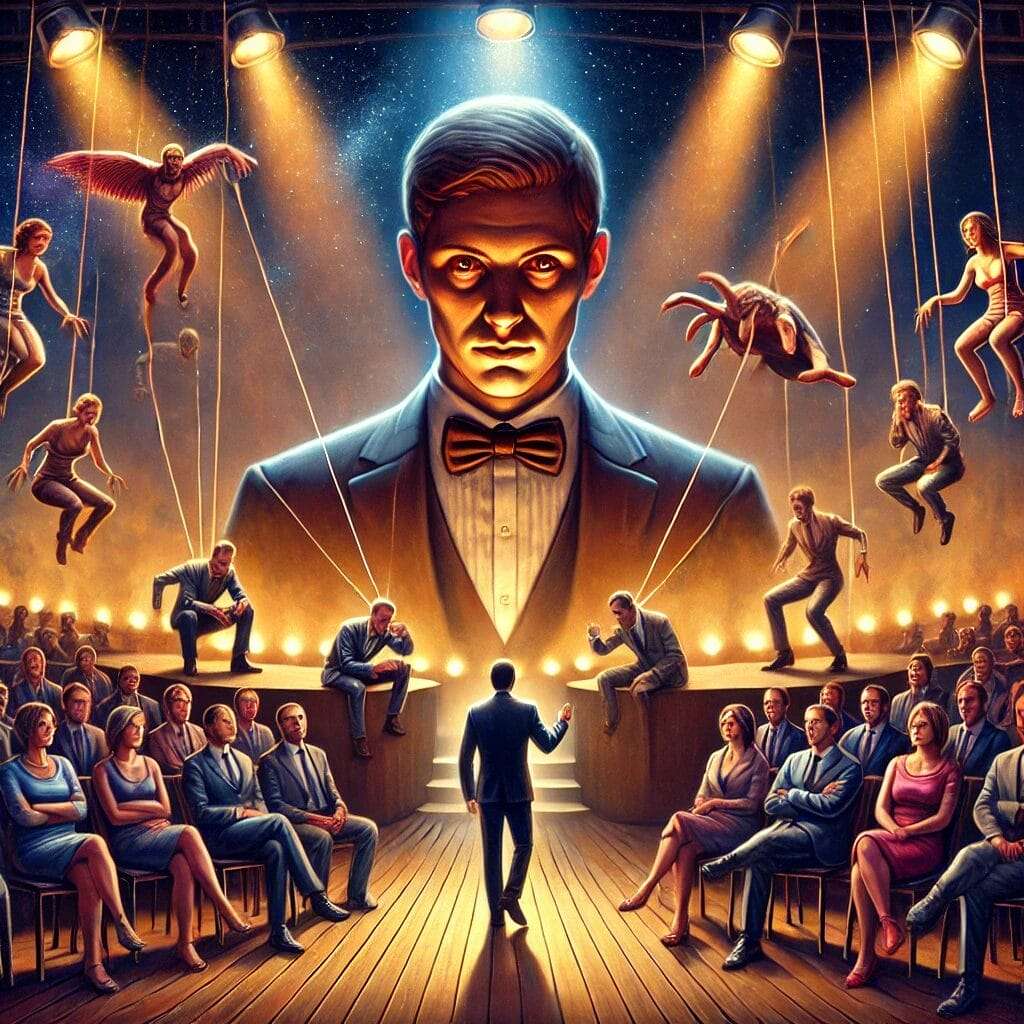🎬 [Cue dramatic voice-over]
Welcome to The Business Games We Play! The show where ambitious business owners unknowingly sabotage themselves, all while thinking they’re making smart decisions!
Tonight, our contestants face their toughest challenge yet: Getting out of their own way. Who will survive? Who will be eliminated by their own excuses? And who will take home the grand prize—a thriving, self-sustaining business?”
[Cut to me (Denise G Lee), stepping in like the host] Oh, and before you judge too harshly… yeah, I’ve been one of these contestants too. Stay tuned for my confessions along the way.
But first, let’s explain how the games:
🎭 What We'll Unpack
About the Psychological Games We Play

Eric Berne and his colleagues laid out a bunch of psychological “games” in Games People Play (1964). These are the unconscious, repetitive social interactions people engage in to get hidden emotional payoffs. Whether in personal, professional, or social settings, these games keep people stuck in unhealthy patterns—sometimes even sabotaging themselves—because they feel familiar and comfortable.
These games aren’t played consciously. They serve as ways to avoid direct communication and true emotional connection. Berne’s Transactional Analysis helps people recognize these patterns, uncover the hidden reasons behind them, and replace them with honest, straightforward interactions.
Here are some classic games people play, along with simple explanations:
1. “Why Don’t You – Yes, But” (YDYB)
Someone shares a problem and asks for advice, but every suggestion is met with, “Yes, but…” They aren’t looking for a real solution—just validation that their problem is impossible to solve.
2. “Now I’ve Got You, You Son of a B**” (NIGYSOB)
Someone sets another person up to fail or catches them in a mistake, then comes down on them hard. It’s all about feeling morally superior.
3. “If It Weren’t for You” (IWFY)
Someone blames another person (spouse, boss, parent) for why they’re unhappy or unsuccessful, instead of taking responsibility for their own choices.
4. “See What You Made Me Do”
Someone shifts blame for their own mistakes or bad choices onto someone else—avoiding accountability and making others feel guilty instead.
5. “Look How Hard I’ve Tried”
Someone puts in just enough effort to say they tried, but not enough to actually succeed. When they fail, they use it as proof that nothing works for them.
6. “Let’s You and Him Fight” (LYAHF)
A third person stirs up conflict between two people, sitting back and enjoying the drama—or gaining something from the fight.
7. “Kick Me”
Someone acts in ways that invite rejection, criticism, or mistreatment, reinforcing their belief that they’re a victim.
8. “Ain’t It Awful”
A group of people bond by complaining about others or the world, but no one takes action to improve the situation.
9. “I’m Only Trying to Help You”
Someone gives unsolicited advice and then gets frustrated or resentful when the other person doesn’t take it.
10. “Schlemiel”
A person repeatedly makes mistakes or causes trouble, then seeks forgiveness and sympathy from others instead of taking responsibility.
11. “Poor Me”
A person continuously portrays themselves as a victim, seeking pity and avoiding personal accountability.
12. “Rapo”
Someone flirts or acts seductive, then later flips the script and accuses the other person of being inappropriate—gaining power through guilt.
13. “Cops and Robbers”
Someone positions themselves as a rebellious rule-breaker, blaming authority figures instead of owning their own behavior.
14. “Let’s Pull a Fast One on Joey”
A group works together to deceive or take advantage of someone, usually for their own amusement or benefit.
15. “Wooden Leg”
Someone uses a past trauma, addiction, or disability—real or exaggerated—as an excuse for avoiding responsibility or effort. Instead of working through challenges, they say, “What do you expect? I have a wooden leg.”
16. “Courtroom”
Instead of actually solving a conflict, people turn it into a trial. One person plays the plaintiff (the victim), another the defendant (the accused), and a third acts as the judge. The goal isn’t resolution—it’s winning.
17. “Blemish”
Someone fixates on the flaws and mistakes of others to feel superior. They rarely praise, always criticize, and seem to enjoy pointing out imperfections.
These games run on hidden motives, keeping people trapped in unhealthy cycles. The way out? Recognize the game, understand why it’s happening, and step out of the script. Real connection comes from honesty—not these predictable, repetitive patterns.
Now, let’s meet our 12 contestants—each stuck in their own business game. As you read through, see if you’ve ever played a small or big role in any of them, whether in the past or right now.
The Types of Psychological Business Games We Play
Read through the whole list or skip ahead to the contestant that catches your eye.
Contestant #1: Bob, The Blame-Shift CEO

Game: If It Weren’t for My Team (IWFMT)
Reality Show Scenario:
- Bob dramatically sighs in his confessional. “Ugh, my employees just don’t take initiative!”
- [Cut to footage of Bob giving vague instructions, never training his team, and ignoring emails.]
- When things go wrong, Bob fires someone… only to repeat the cycle.
What’s Really Happening? Bob is blaming his team instead of addressing his passive aggressive tendencies.
Host Commentary (Me Breaking the Fourth Wall):
“Oh boy, I know this game. Back in the day, I hired people without proper onboarding, then got mad when they couldn’t deliver. Turns out, ‘leadership’ isn’t just hoping people magically understand you.”
Contestant #2: Sarah, The Advice Collector

Game: Why Don’t You – Yes, But (YDYB)
Reality Show Scenario:
- Sarah sits in a mastermind meeting. “I really need help with my marketing!”
- [Cut to five experts giving her solid advice.]
- She nods… then immediately replies, “Yes, but that won’t work for my industry.”
- [Cut to her repeating this cycle in different outfits across multiple episodes.]
What’s Really Happening? Sarah isn’t looking for solutions—she’s looking for excuses.
Host Commentary:
“I WAS SARAH. Oh, the amount of advice I ‘collected’ only to reject every solution because I was secretly afraid to change… Listen, if every idea sounds impossible, the problem isn’t the idea—it’s you.”
Contestant #3: Jim, The Gotcha Boss

Game: Now I’ve Got You, You Son of a B***!* (NIGYSOB)
Reality Show Scenario:
- Jim intentionally withholds information from his new marketing assistant.
- When they make a mistake, he storms in: “HOW COULD YOU MESS THIS UP?!”
- [Cut to dramatic slow-motion replay of Jim flipping a table.]
What’s Really Happening? Jim thrives on feeling superior and setting others up to fail.
Host Commentary:
“Classic power move. You set someone up for failure, then act outraged when they fail. Let’s be real—if you love ‘catching’ people messing up, you’re the problem.”
Contestant #4: Lisa, The Market Blamer

Game: See What the Market Made Me Do
Reality Show Scenario:
- Lisa refuses to market her business and claims “the economy is just tough.”
- [Cut to her scrolling social media, watching Netflix, and “manifesting success.”]
- [Cut to her shocked expression when sales don’t magically appear.]
What’s Really Happening? Lisa is blaming external factors instead of adapting her strategy.
[Midway Commercial Break: “Behind the Scenes with the Host”]

At this point, cut to me, casually sipping coffee behind the scenes.
“You ever watch a reality show and think, ‘Wow, these people are so clueless’? Yeah… that was me, too. Let’s pause for a quick confession: I used to play Kick Me—the game where you undercharge, overdeliver, and then get mad when people take advantage of you.”
Cue flashback to me saying, “I just want to HELP people!” while also crying over an unpaid invoice.
Yeah… turns out, letting people walk all over you isn’t generosity—it’s bad boundaries.
Contestant #5: Tony, The Hard-Work Hero

Game: Look How Hard I’ve Tried
Reality Show Scenario:
- Tony collapses onto his desk. “I’VE TRIED EVERYTHING!”
- His assistant looks at his to-do list:
- ✅ Posted on Instagram (twice)
- ✅ Watched a marketing webinar
- ✅ Refreshed inbox 27 times
- [Cut to Tony sobbing dramatically while whispering, “The universe is against me.”]
What’s Really Happening? Tony is confusing effort with strategy.
Host Commentary:
“Listen, effort is great. But if your ‘hard work’ isn’t tied to a real strategy, you’re just spinning your wheels.”
Contestant #6: Jane, The Doormat CEO

Game: Kick Me
Reality Show Scenario:
- Jane undercharges, over-delivers, and lets clients walk all over her.
- “I just want to HELP people!” she says, while crying over an unpaid invoice.
- [Cut to her working late for free while her clients sip cocktails in Tulum.]
What’s Really Happening? Jane is afraid to set boundaries.
Contestant #7: Mark, The Entrepreneurial Gossip

Game: Ain’t It Awful
Reality Show Scenario:
- Mark meets up with his entrepreneur friends for coffee.
- They complain about clients, algorithms, and “how hard business is.”
- [Cut to them spending two hours venting instead of solving problems.]
What’s Really Happening? Complaining feels good, but it doesn’t fix anything.
Contestant #8: Kevin, The Over-Giver

Game: I’m Only Trying to Help You
Reality Show Scenario:
- Kevin gives free advice to everyone.
- When people don’t listen, he gets mad: “WHY ask for help if you won’t take it?!”
- [Cut to him ranting in a Facebook group, furious that no one values his wisdom.]
What’s Really Happening? Kevin isn’t really helping—he’s trying to feel important.
Contestant #9: Mike, The Chaos Entrepreneur

Game: Schlemiel
Reality Show Scenario:
- Mike makes reckless business decisions and expects his accountant to “fix it.”
- [Cut to his accountant facepalming as Mike says, ‘I spent all our money on NFTs… can you make it go away?’]
What’s Really Happening? Mike isn’t running a business—he’s looking for a babysitter.
Contestant #10: Maria, The Business Martyr

Game: Poor Me
Reality Show Scenario:
- Maria works 80-hour weeks and makes sure everyone knows how much she suffers.
- [Cut to her dramatically collapsing on her desk, whispering, “No one appreciates how hard I work.”]
- [Cut to her refusing to hire help, raise prices, or improve systems.]
What’s Really Happening? Maria is addicted to struggle and won’t admit she needs a better plan.
Contestant #11: Steve, The Rebel Without a Plan

Game: Cops and Robbers
Reality Show Scenario:
- Steve refuses to follow standard business practices.
- “The system is RIGGED!” he shouts, while refusing to learn basic marketing.
- [Cut to him blaming ‘the algorithm’ for his lack of sales.]
What’s Really Happening? Steve isn’t a rebel—he just hates structure and accountability. In psychology circles, we call it oppositionality—learn more about it here.
Contestant #12: Karen, The Micromanager

Game: Blemish
Reality Show Scenario:
- Karen finds a typo in an email her assistant sent.
- “THIS IS UNACCEPTABLE!” she yells, ignoring the fact that sales are growing.
- [Cut to her micromanaging everyone to death instead of focusing on growth.]
What’s Really Happening? Karen is using perfectionism to justify her control issues. Karen has been engaging in controlling behavior as a way to feel safe—something that started in childhood.
Grand Finale: Who Will Win The Business Games?

As the final round approaches, only one contestant will survive the elimination. But before that, you will see:
- Jim gets kicked off for sabotaging his own team.
- Sarah gets sent home for rejecting every good idea.
- Tony collapses before the finish line, exhausted from working hard on all the wrong things.
🏆So, who will be the winner? The entrepreneur who stops playing games and starts making real decisions.
[Cut to Me, Holding the Grand Prize]
And the prize? 🎁 A business that actually works. No gimmicks. No drama. Just smart, strategic action.
Final Confessional and Closing Thoughts
🎬 [Cue inspirational music]
If you saw yourself in any of these contestants… welcome to the club. We’ve all been there. But the good news? You don’t have to stay there.
The moment you stop playing these business mind games and start leading with clarity, action, and self-awareness… that’s when you actually win.
Now, tell me—which contestant felt a little too familiar? No judgment, I promise. (Okay, maybe a little.)
All jokes aside, we’ve all played games—with ourselves and others. This isn’t about self-flagellation. It’s about understanding how we use these patterns to keep ourselves safe from the unfamiliar, the uncomfortable, the new.
But real success—both in business and in life—comes when we’re brave enough to break free from old, limiting scripts. When we stop hiding behind fear and start leading with honesty, that’s when we truly win.
I dive deeper into these ideas on my podcast. If you haven’t tuned in yet, now’s the time. Until next time—observe the games, just don’t be a player!
🔥 Want to go deeper? If you’re serious about untangling these patterns and stepping into real leadership, let’s talk. Learn more about working with me here.



